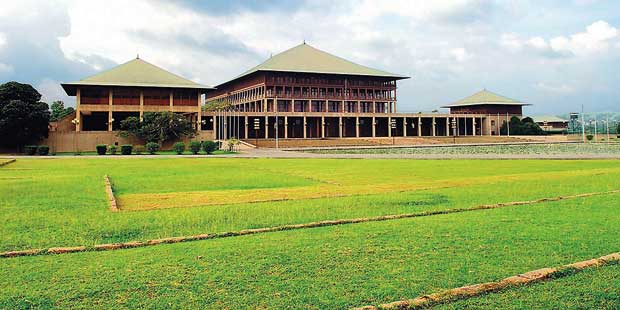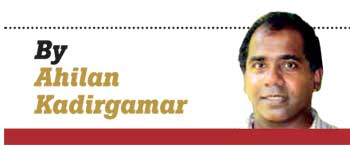Constitutional Reform and Political Diversions


The Government is dragging out the Constitutional Reform process. Is it a lack of political will? Fear of reaction from the Joint Opposition? Or preoccupation with the crisis-prone economy?
Historically, it has been a combination of all three - rickety political will, fear of political backlash and repeated economic crises - that derailed efforts at constitutional reform. Rather than mere barriers to constitutional reform, I would argue that these three concerns are part and parcel of the political solution itself.
Historically, it has been a combination of all three - rickety political will, fear of political backlash and repeated economic crises - that derailed efforts at constitutional reform. Rather than mere barriers to constitutional reform, I would argue that these three concerns are part and parcel of the political solution itself.
Postcolonial woes
The promise of the postcolonial Sri Lankan state was from its outset betrayed by oppression and exclusion. Since independence, the majoritarian and class logics of the state have alienated minority communities and marginalised much of the rural and urban population. The response of the state to protests by these peoples was to repress or placate, the latter often through the provision of economic relief.
The original sin of the postcolonial state was one of the worst acts of exclusion with the disenfranchisement of the Up-Country Tamils. Efforts that claimed to be inclusive, for instance indigenisation of language policy, culminated in “Sinhala Only”, which excluded over a quarter of the country’s population whose first language was Tamil.
State repression led to escalation of youth movements in the north and the south, and eventually insurrections and protracted armed conflicts. The tyranny meted out by the state during the first JVP insurrection of 1971 without addressing youth grievances only led to the even more brutal insurgency and counter-insurgency of the late 1980s. The efforts to crush Tamil militancy with the Prevention of Terrorism Act and the state of Emergency in the late 1970s only saw militancy spread and grow. The escalation of the conflicts with armed movements, led to more and more state repression, in cycles of mass violence.
insurrection of 1971 without addressing youth grievances only led to the even more brutal insurgency and counter-insurgency of the late 1980s. The efforts to crush Tamil militancy with the Prevention of Terrorism Act and the state of Emergency in the late 1970s only saw militancy spread and grow. The escalation of the conflicts with armed movements, led to more and more state repression, in cycles of mass violence.
Next, top-down approaches to ‘development,’ touted to address the grievances of oppressed classes and minorities have equally failed. Colonization and agricultural schemes in the 1950s and 1960s, did little to address the mounting alienation of the rural Sinhala youth. Instead, they aggravated the fears of the Tamil population that they may be dispossessed from their lands. Similarly, the left forces that constituted the United Front government pandered to Sinhala Buddhist nationalism in taking forward their version of socialist economic development. While the import substitution policies led to an agricultural boom benefiting the North in the 1970s, such economic changes could not counter the rise of Tamil nationalist militancy.
Arguably ideologies that spawn ethno-nationalist movements and youth insurrections have complex causes and dynamics, but what is clear from our tragic history is that repression and economic development alone cannot address them. The Rajapaksa regime’s post-war experiment most clearly shows us that the push for economic development as a solution combined with militarised repression, only polarised the country and was soundly rejected.
The original sin of the postcolonial state was one of the worst acts of exclusion with the disenfranchisement of the Up-Country Tamils. Efforts that claimed to be inclusive, for instance indigenisation of language policy, culminated in “Sinhala Only”, which excluded over a quarter of the country’s population whose first language was Tamil.
State repression led to escalation of youth movements in the north and the south, and eventually insurrections and protracted armed conflicts. The tyranny meted out by the state during the first JVP
 insurrection of 1971 without addressing youth grievances only led to the even more brutal insurgency and counter-insurgency of the late 1980s. The efforts to crush Tamil militancy with the Prevention of Terrorism Act and the state of Emergency in the late 1970s only saw militancy spread and grow. The escalation of the conflicts with armed movements, led to more and more state repression, in cycles of mass violence.
insurrection of 1971 without addressing youth grievances only led to the even more brutal insurgency and counter-insurgency of the late 1980s. The efforts to crush Tamil militancy with the Prevention of Terrorism Act and the state of Emergency in the late 1970s only saw militancy spread and grow. The escalation of the conflicts with armed movements, led to more and more state repression, in cycles of mass violence. Next, top-down approaches to ‘development,’ touted to address the grievances of oppressed classes and minorities have equally failed. Colonization and agricultural schemes in the 1950s and 1960s, did little to address the mounting alienation of the rural Sinhala youth. Instead, they aggravated the fears of the Tamil population that they may be dispossessed from their lands. Similarly, the left forces that constituted the United Front government pandered to Sinhala Buddhist nationalism in taking forward their version of socialist economic development. While the import substitution policies led to an agricultural boom benefiting the North in the 1970s, such economic changes could not counter the rise of Tamil nationalist militancy.
Arguably ideologies that spawn ethno-nationalist movements and youth insurrections have complex causes and dynamics, but what is clear from our tragic history is that repression and economic development alone cannot address them. The Rajapaksa regime’s post-war experiment most clearly shows us that the push for economic development as a solution combined with militarised repression, only polarised the country and was soundly rejected.
Democracy and Rulers
When the State addresses challenges against it with repression and economic hand-outs, the citizenry responds politically with protests, and at crucial moments voting out regimes. However, the need throughout history has been for a political force that can engage the people and bring together those who have been ravaged by oppression and exclusion. The election of the PA Government in 1994 was a moment of hope for such a political solution and to address the dispossession of the peasantry and the working classes. However, the LTTE’s return to war and the then Government’s continuation of neo-liberal policies ended that opening.
"The promise of the postcolonial Sri Lankan state was from its outset betrayed by oppression and exclusion"
The major problem in our history, is that successive regimes at the helm of state power have repeatedly failed to engage the public with a far reaching political vision. Such democratic engagement requires political will, challenging the opposition head on and addressing economic issues that are so much a part of the body politic. However, beyond the democratic vision of regimes, they are also constrained by the classes and political bases they are beholden to.
Historically, the cunning of rulers has been to separate their political and economic manoeuvres. The Jayewardene regime, for example, took forward open economic policies to serve its class interests, even as it piped up its Sinhala Buddhist leanings to maintain a broad political base. And as the economic policies increased inequalities and disaffected its political base, the regime became more and more repressive. The attacks on the Tamil community projected as the enemy, as with the July 1983 pogrom, were also its efforts to mobilise its Sinhala Buddhist base. Of course, at some point such contradictions are exposed to the public, but by then the damage is done.
Historically, the cunning of rulers has been to separate their political and economic manoeuvres. The Jayewardene regime, for example, took forward open economic policies to serve its class interests, even as it piped up its Sinhala Buddhist leanings to maintain a broad political base. And as the economic policies increased inequalities and disaffected its political base, the regime became more and more repressive. The attacks on the Tamil community projected as the enemy, as with the July 1983 pogrom, were also its efforts to mobilise its Sinhala Buddhist base. Of course, at some point such contradictions are exposed to the public, but by then the damage is done.
Political Engagement
The current Government also approaches the political and economic processes in isolation. Even worse, they seem to believe that constitutional reform experts and economic policy gurus can substitute for mobilising and engaging the people. It is the neo-liberal conceit of governments that leads them to believe that legal and economic experts can determine the structure and policies of the state and its relationship to its citizens. Time and again, such an approach, has ended in failure.
In 2015, there was an overwhelming mandate for constitutional reform. The citizenry from the different communities voted courageously in the Presidential election, and again supported the Government in the general elections held eight months later. Yet, by mid-2016, the Government had transferred its mandate to experts. The constitutional process went into close door sessions, ignoring for the most part, the outcome of the Public Representation Committee on Constitutional Reforms (PRC). The PRC, despite the limitations placed on it by the Government, had meaningfully engaged the people.
Government in the general elections held eight months later. Yet, by mid-2016, the Government had transferred its mandate to experts. The constitutional process went into close door sessions, ignoring for the most part, the outcome of the Public Representation Committee on Constitutional Reforms (PRC). The PRC, despite the limitations placed on it by the Government, had meaningfully engaged the people.
If the last year, after the PRC proceedings, have been a loss for the constitutional reform process, the Government and the TNA leadership only have themselves to blame for not having engaged the public. Such engagement is also necessary to confront the nationalist mobilisations in both the South and the North. Indeed, as our past history illustrates the oppositional forces in parliament mobilising chauvinist forces onto the streets and the separatist military moves of the LTTE have disrupted many an effort at a political solution.
In the year ahead, it is not just chauvinist politics that will create trouble for constitution making, the mounting economic problems may well deflect the political process. Indeed, times of economic crisis are opportune moments for chauvinist forces. A government that engages the people on its political and economic programme can carry them through tumultuous times, but that is not the case with the current Government.
In 2015, there was an overwhelming mandate for constitutional reform. The citizenry from the different communities voted courageously in the Presidential election, and again supported the
 Government in the general elections held eight months later. Yet, by mid-2016, the Government had transferred its mandate to experts. The constitutional process went into close door sessions, ignoring for the most part, the outcome of the Public Representation Committee on Constitutional Reforms (PRC). The PRC, despite the limitations placed on it by the Government, had meaningfully engaged the people.
Government in the general elections held eight months later. Yet, by mid-2016, the Government had transferred its mandate to experts. The constitutional process went into close door sessions, ignoring for the most part, the outcome of the Public Representation Committee on Constitutional Reforms (PRC). The PRC, despite the limitations placed on it by the Government, had meaningfully engaged the people. If the last year, after the PRC proceedings, have been a loss for the constitutional reform process, the Government and the TNA leadership only have themselves to blame for not having engaged the public. Such engagement is also necessary to confront the nationalist mobilisations in both the South and the North. Indeed, as our past history illustrates the oppositional forces in parliament mobilising chauvinist forces onto the streets and the separatist military moves of the LTTE have disrupted many an effort at a political solution.
In the year ahead, it is not just chauvinist politics that will create trouble for constitution making, the mounting economic problems may well deflect the political process. Indeed, times of economic crisis are opportune moments for chauvinist forces. A government that engages the people on its political and economic programme can carry them through tumultuous times, but that is not the case with the current Government.
People and the State
If the postcolonial state was hijacked by majoritarian and class interests, any reform of the state would have to take on both simultaneously. There is only one way to do this, and that is through public engagement.
In this context, the neo-liberal elite and think tanks in Colombo also reinforce expert-led – as opposed to people-centred – political and economic processes. They oppose the inclusion of economic, social and cultural rights (ESCR) in the Constitution. It is not that constitutional provisions for ESCR on their own will guarantee social welfare. Indeed, legal provisions without peoples’ movements have achieved little, as evident from the experience in many parts of the world. The aversion to ESCR of these legal and economic experts reflects their class character and reluctance to place juridical constraints on the state, which denies the marginalised economic justice.
In this context, the neo-liberal elite and think tanks in Colombo also reinforce expert-led – as opposed to people-centred – political and economic processes. They oppose the inclusion of economic, social and cultural rights (ESCR) in the Constitution. It is not that constitutional provisions for ESCR on their own will guarantee social welfare. Indeed, legal provisions without peoples’ movements have achieved little, as evident from the experience in many parts of the world. The aversion to ESCR of these legal and economic experts reflects their class character and reluctance to place juridical constraints on the state, which denies the marginalised economic justice.
"The aversion to ESCR of these legal and economic experts reflects their class character and reluctance to place juridical constraints on the state, which denies the marginalised economic justice"
The Sinhala Buddhist nationalist constituencies are rallying around and insisting on preserving the unitary concept of the state. However, the broader South has not been engaged on the unitary state as a relentless structure of centralised power used for political repression and economic dispossession. Rather, the bogey of separatism is brought out to justify majoritarian control and development priorities that will undermine regional concerns.
Extensive devolution of power within a united Sri Lanka has anchored the debate on constitutional reform for many progressives since the 1990s. We need to go further and look at how devolution relates to class and other social structures, including caste, gender and the neglected minorities such as the Northern Muslims and the Up-Country Tamils. Those concerns were also echoed by the diverse groups of people who came forward to engage the PRC last year.
If the people in the rural countryside and in the urban shanties - who are day in day out ignored by policies of the centralised state in Colombo that is for example prioritising building the port city and a financial centre - have a say about the unitary state, they are far more likely to shed it than those close to state power. If the bulk of our population, who are students, teachers, patients, healthcare providers or their relatives, are asked about free education and health, they are indeed likely to support the enshrinement of economic rights in the Constitution, than the small section of the elite who can rely on private education and healthcare.
The ordinary people in the North and the South, who face the common predicament of eking out a livelihood and the increasing precariousness of social and economic life, are more likely to find ways of co-existing with other communities, than the political elite who live off majoritarian and nationalist fears. But such a people-centred democratic process of state reform is rarely given a chance, because the role of the modern state in the capitalist system has been one of oppressing and excluding people.
Extensive devolution of power within a united Sri Lanka has anchored the debate on constitutional reform for many progressives since the 1990s. We need to go further and look at how devolution relates to class and other social structures, including caste, gender and the neglected minorities such as the Northern Muslims and the Up-Country Tamils. Those concerns were also echoed by the diverse groups of people who came forward to engage the PRC last year.
If the people in the rural countryside and in the urban shanties - who are day in day out ignored by policies of the centralised state in Colombo that is for example prioritising building the port city and a financial centre - have a say about the unitary state, they are far more likely to shed it than those close to state power. If the bulk of our population, who are students, teachers, patients, healthcare providers or their relatives, are asked about free education and health, they are indeed likely to support the enshrinement of economic rights in the Constitution, than the small section of the elite who can rely on private education and healthcare.
The ordinary people in the North and the South, who face the common predicament of eking out a livelihood and the increasing precariousness of social and economic life, are more likely to find ways of co-existing with other communities, than the political elite who live off majoritarian and nationalist fears. But such a people-centred democratic process of state reform is rarely given a chance, because the role of the modern state in the capitalist system has been one of oppressing and excluding people.

